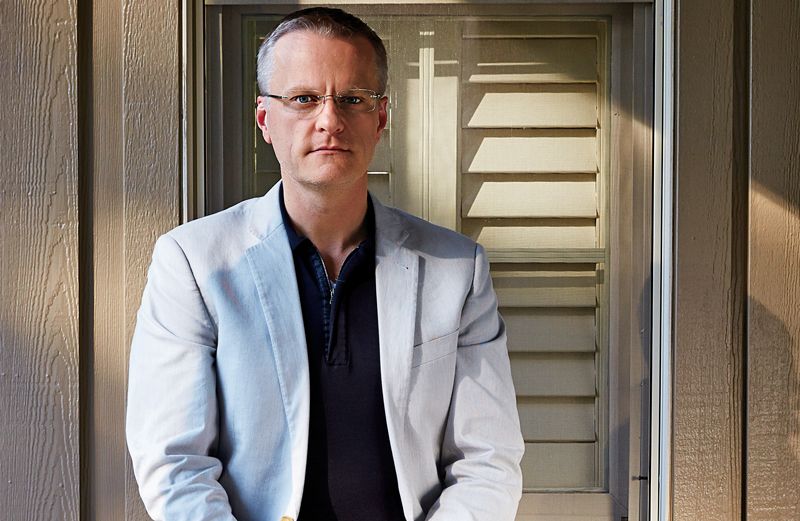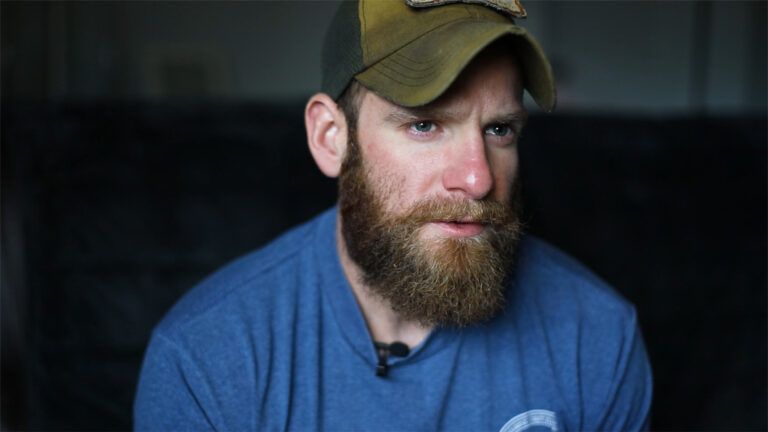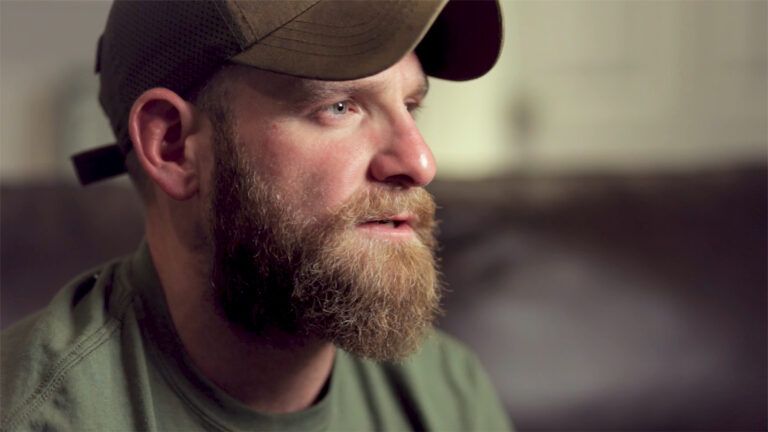Paul Statzer. For a second, I thought about writing his name down on the questionnaire and leaving it at that. It was April 2005. My four-month deployment at the 332nd Air Force Theater Hospital at Balad Air Base in Iraq was almost over.
Four months. It was the maximum time the Air Force believed a combat surgeon could hold up under the stress. This last bit of paperwork was all that stood between me and going home.
“Have you been in combat or been exposed to situations in which you felt your life was in danger?
“Have you seen or been exposed to things you feel may be difficult for you to forget or which you feel may be troubling to you in the future?”
Sergeant Paul Statzer. Of all the carnage I’d witnessed, his was the case that still haunted me. I could picture him lying on the operating table in the hospital tent, the left side of his face and forehead stripped away by a bomb, part of his brain exposed, shrapnel embedded deep within.
I’d had to remove half his frontal lobe before I’d managed to stabilize him enough to be flown to the military hospital in Germany. I’d called his father in Pennsylvania to tell him what happened. It seemed like the least I could do, but even then I felt like I’d failed.
I couldn’t get Mr. Statzer to understand that there was no way his son would be coming home alive. He’d even tried to comfort me. Denial. Sometimes it’s the first line of defense.
As a brain surgeon specializing in trauma, I’d been sent to Iraq to save lives. But it was impossible to feel good about anything I’d done there.
I was one of 20 surgeons at the hospital. Soldiers arrived in waves, 20 or 30 at a time, arms and legs shredded, massive head injuries, faces no longer recognizable.
In early 2005, the Balad base was the most heavily mortared spot in Iraq. It seemed forsaken even by God.
Did I really need to fill out a form for the Air Force to understand the horror I’d witnessed? I checked yes for each question, not bothering to use the space provided for further explanation. No one went over the questionnaire with me.
The next day a nurse checked my vitals and drew some blood. She signed a form saying I was healthy enough to go home.
Before my deployment I’d worked as a neurosurgeon at an Air Force medical center in San Antonio, Texas, for four years, in exchange for the military putting me through med school. I was grateful and proud to serve my country. I’d given it my all, even at the cost of my marriage.
Now I was looking forward to the next chapter, starting my own practice, a new life.
I shipped home four black trunks full of memories–my uniforms, pieces of shrapnel and bullets I’d removed, a flash drive with thousands of photos and digital CT scans, without the patients’ names.
I thought I might one day use them for research. But I never opened the trunks. I stacked them in the back of my garage.
A few months after coming home I opened a neurosurgery practice in Auburn, Alabama. In May 2006 I was remarried, to a woman I knew from church.
Lisa was smart (soon she was managing my practice), nurturing, funny. I’d never known anyone so easy to talk to.
But the one thing I never talked to her about was my time in Iraq. Our life together was good. Why dig up the past?
Then one night in 2010, Lisa and I were flipping through the channels on TV when we came across an HBO military drama. Soldiers screamed as their Humvee hit an IED.
My heart started pounding. I told Lisa I was okay, but for weeks afterward, I had nightmares.
A soldier dying on the operating table. The smell of burned flesh. Explosions. What was wrong with me? I was a neurosurgeon. I knew how the brain worked. Yet I couldn’t explain this. I felt like I was losing my mind.
One day, driving with Lisa, I stopped at a red light. A helicopter crossed above us. The next thing I knew, Lisa was saying, “Honey, are you all right?”
The driver behind us honked.
“What happened?” I asked.
“You stared at the helicopter through a green light,” she said.
Click here to donate gift subscriptions to Guideposts Military Subscription Program.
As soon as we got home, Lisa said, “Lee, you’re having nightmares. Now you’re zoning out. What’s wrong?”
I felt ashamed. Confused. But I knew there was no way I was going to be able to brush this off. “I was waiting for that chopper to turn,” I said. “I thought it was going to land on the highway so I could operate on whoever was inside.”
“It’s okay if you don’t want to talk about it,” she said. “But you need to write down what happened to you. You can’t keep all this bottled up inside.”
Still I tried. I asked God to give me peace, but my nightmares and anxiety only grew worse. Why hadn’t I been able to do more for my patients? Why had I failed them?
At the hospital one day, I bumped into a psychiatrist friend. “Do you have a minute?” I asked. We grabbed some coffee in the doctors’ lounge and I told him everything I’d been dealing with.
“What you’re describing are symptoms of PTSD,” he said.
“How can I have PTSD?” I asked. “I wasn’t in combat.”
“But you were mortared and you never knew when the next attack would come, right? And you saw some pretty horrible things. That’s a lot to process. What kind of counseling did you get when you came home?”
“None,” I said. “I wasn’t having any problems then.”
He nodded. “How long has it been since you looked through the stuff you brought home?”
I took a deep breath. “I haven’t. It’s all packed away in the garage.”
“Here’s my prescription,” he said. “Go home. Unpack your trunks and tell your wife everything you went through. Then write it down. You can’t keep all these memories and emotions to yourself. You have to learn to let go.”
That night after dinner, Lisa and I pulled the four trunks down onto the floor. We peeled off the packing tape and opened the first trunk. I laid out my uniforms, my helmet and boots.
“What’s this?” Lisa asked, reaching for a small plastic jar. I opened it and dumped the contents, dozens of bullets and pieces of shrapnel, into my hand. Each was attached to a memory I’d tried to forget. Now they all came rushing back.
I handed one of the bullets to Lisa. “This came from an AK-47,” I said. “I took it out of a little Iraqi boy’s head.”
I could picture his bloodied face, his pierced skull. An innocent child, felled by stray gunfire. “He was lucky. He went home after three days.”
I picked up a piece of shrapnel. “This one came from a vein tear in a Marine’s brain. I couldn’t stop the bleeding. There was nothing I could do but watch him die.”
We went through it all, piece by piece. When we came to the last trunk I was exhausted.
At the very bottom lay a USB flash drive. It held all the photos I’d taken, the digital CT scans, a record of nearly every surgery I’d done.
“Let’s take a quick look,” Lisa said.
In the house I slid the drive into the computer. A pinwheel spun for a moment, then the screen filled with file folders.
“That’s odd,” Lisa said, pointing to the screen. “All the folders are labeled with a date, except this one.”
I looked where she was pointing. I’d labeled the file Statzer, Paul.
“That was a tough one,” I said. “The pictures are pretty graphic.”
“It’s okay,” Lisa said. “I can take it.”
I clicked the folder open. Images of Sergeant Statzer’s burned and shattered skull flashed across the screen, a slide show of the single worst case I’d ever seen, the surgery I’d replayed over and over in my mind.
If only there was something more I could have done. Some comfort I could have given his father that night.
“How did he do?” I heard Lisa ask, her words jerking me back to the present.
Bring faith and inspiration to our troops! To donate a Guideposts subscription now, click here.
“I have no idea,” I said. “I’m sure he died before he got home.”
Before I could stop her, she Googled Paul Statzer. Up came a link to a news story and video of Paul. His head was heavily bandaged but he was very much alive, being interviewed about an upcoming surgery to rebuild his skull.
“That’s impossible,” I said when finally I managed to speak. “Three of us operated on him. None of us thought there was any chance he’d survive.”
“Call him. You need to know what happened.”
It was a couple of days before I could bring myself to pick up the phone. I couldn’t find a number for Paul. Again, just as I had five years earlier, I called his father. Only this time Lisa was there beside me.
After several rings a man answered. “Jim Statzer.”
“This is Dr. Lee Warren. I was the neurosurgeon who operated on your son in Iraq.”
Silence. Finally he said, “Are you the one who called me that night?”
“Yes, sir, I am.”
Another long pause. “I don’t mean any disrespect,” he said. “But I need to know for certain that this is for real. Can you tell me what I said the night you called?”
“I can,” I said. “Your exact words were, ‘Doctor, by the grace of God, I know my son is going to be okay.’”
“Thank you,” he said, his voice so hushed I could barely hear it. “Thank you for saving my son.” He told me Paul had been in a coma for months.
The doctors at Walter Reed Army Medical Center said there was no hope. But Paul’s parents believed his survival was in God’s hands.
It wasn’t denial I’d heard in Mr. Statzer’s voice that night. It was faith.
Gradually Paul showed signs of awakening–a finger twitching, his right eye briefly opening. He’d undergone dozens of surgeries and skin grafts, had a plastic skullcap placed over his brain.
His left eye, like the part of his frontal lobe I’d had to remove, was beyond repair. Is he still alive? I was afraid to ask.
“Would you like to speak to Paul?”
Lisa had heard. She nudged me. “Yes, sir,” I said. “I’d love to.”
Seconds later I heard a voice I’d never expected to hear. “Dr. Warren, this is Paul Statzer. Thank you for being there when I needed you.”
I was stunned. Healing Paul had been far beyond my abilities. But not God’s. He had to have been there with me in Iraq, guiding me through the chaos of war, just as he would guide me through my struggles coming home.
“Sergeant Statzer, I’d like to thank you for your service,” I said at last. “It was an honor for me to take care of you.”
A few months later Lisa and I flew to Pennsylvania. We met the Statzers at a restaurant and I watched in awe as Paul strode to our table, holding onto his father’s arm for balance.
He’d suffered one of the worst brain injuries I’d ever seen, yet here he was, with no discernible speech difficulties.
I was 7,000 miles and five years away from Iraq, but it felt like I was in that dusty ICU tent checking in on a post-op patient. My service, at last, was complete.
Click here to learn more about Veterans Awareness Month and what you can do to help.






